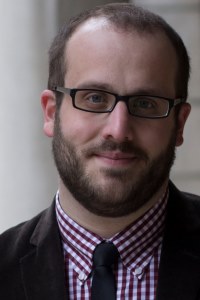Meet the Institute composers: David Biedenbender
 David Biedenbender is one of the four composers of the inaugural NJSO Edward T. Cone Composition Institute. His work Strange, Beautiful Noises was inspired by the birth of his first son and the emotional year that preceded his son's arrival.
David Biedenbender is one of the four composers of the inaugural NJSO Edward T. Cone Composition Institute. His work Strange, Beautiful Noises was inspired by the birth of his first son and the emotional year that preceded his son's arrival.
What attracted you to the NJSO Edward T. Cone Composition Institute?
The opportunity to work with a professional symphony orchestra is always appealing. Fortunately, it seems like growing number of orchestras across the country are becoming more interested in engaging contemporary music and young composers, which is heartening.
This Institute [with the NJSO and Princeton University Department of Music] in particular was interesting because there was a performance involved—most orchestras have offered reading sessions that are for a couple of hours, then you’re done. This is a more extensive program.
I also really admire [composer, Princeton University Department of Music Chair and Institute Director] Steve Mackey and his music. I’ve met him a few times, and I love him as a person, so the opportunity to work with him was really appealing to me. And I’ve heard great things about the NJSO—I have some friends who play with the NJSO and I know it’s a great orchestra. I had to apply!
How did your composition career begin?
I wasn’t planning on becoming a composer—I was going to be a medical doctor. I wrote my first piece for my high-school band at the end of high school, and the professor of composition at Central Michigan University approached me after hearing the performance, and he asked me to work with him. So without knowing a whole lot about what I was getting myself into, I did—and I haven’t looked back. I’m currently living in a suburb of Detroit, but I’m actually moving to Boise, Idaho, the week after the Cone Institute is done to take a position [as Assistant Professor of Music Theory and Composition] at Boise State University.
What inspired you to write that first piece?
I was really involved in my high-school music program—I played euphonium, bass trombone and electric bass in the jazz band. Playing music in those situations led me to do some arranging, and it got to the point I was writing more and more of my own notes [into the scores].
I wrote my first piece for high-school band because that’s what I had at my disposal. It was a very programmatic work—a reflection that traced the whole Passion week [leading to Easter] in the Christian tradition. It was 13-and-a-half minutes long, and it had every idea I could possibly throw into one piece! My music program was supportive of it. I got to conduct the premiere, and for me, it was a riveting experience that got me hooked.
What is your proudest accomplishment as a composer to date?
Without being too philosophical, I try not to think a lot about specific things from the past. I appreciate them, and I am always looking to what comes next and where I want to go.
The thing I’m most proud of is having the opportunity to work with really great people. I love collaborating, and I love working with talented musicians. I put something down on a page, but it doesn’t mean a whole lot—it’s not really music—until someone plays it. I’ve been fortunate to work with really great performers, and that’s been the most fun and what I’m most proud of—the opportunity to make really great music with really amazing people. That’s what matters most to me.
I'm excited to work with the @NJSymphony @ WORLD-PREMIERE SATURDAY / http://t.co/jsucl4SuPL http://t.co/O1BGF7Gqdj via @newsle
— David Biedenbender (@davebied) July 9, 2014
IN THE COMPOSER’S WORDS
Strange, Beautiful Noises
Strange, Beautiful Noises was written in the months preceding the birth of my son, Izaak. Along with the usual pre-parental anxiety, I found myself frequently imagining what it would be like to hear so many sounds for the very first time as he does, both through the watery walls of the womb and then suddenly without that warm, safe frequency filter. This piece was a gift to him and also a way for me to work through the anxiety of becoming a father for the first time. Nervous ticking, funk bass lines played by bass clarinet, rewind and reverse playback effects, a trombone solo imitating [famous cartoon character] Charlie Brown’s teacher, Mrs. Donovan, and many other noises make their way into this piece; all these elements eventually spiral into a runaway train-like ending.
Learn more about Biedenbender and the other composers of the NJSO Edward T. Cone Composition Institute.